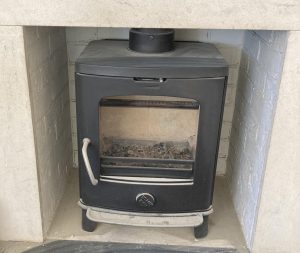
Not a spectacularly unusual or rare stove as I normally feature in my weekly blogs, but I thought I would include this stove as it is the first new Jotul Eco stoves that I have come across on my travels. This is a Jotul F 145 Wood-Burning Stove Swept that I swept recently at an address in Duddenhoe End. It was installed less than a year ago by Thaxted Stoves and had therefore only had one burning season’s usage. Even though the stove is situated in a rather large sitting room, the customer told me that it heats the room more than adequately. I think you will admit that this particular stove has a very contemporary, workman like appearance, sitting well as it does in a very contemporary setting.
Jotul are a Norweigan company and have been making stoves and fireplaces for over 160 years. Jotul are proud of their global status, selling their products in 43 different countries spread over six continents – Truly a global brand!
Jøtul was founded by Oluf Onsum as Kværner Jernstøberi (Kværner Foundry) in the outskirts of Christiania (now Oslo) in 1853. While stoves initially were the main products, the company had diversified by the beginning of the 20th century, when it produced turbines and lumber equipment.
As the heating appliance manufacture decreased in importance, the production was spun off in 1916 and sold to Herman Anker, one of Kværner’s managers. He founded Jøtul AS in 1920 as a sales organization for its products. The sales stagnated during the depression in the 1920s, and 36-year-old Herman Anker died in 1927, leaving it to his successor, 34-year-old Johannes Gahr to modernize and eventually salvage the company. By 1935, the turnaround had succeeded, and the firm acquired its modern name.
By the 1960s, stoves using liquid fuels, especially kerosene had supplanted wood-burning appliances, a trend that was only reversed in the 1970s, partly due to the 1973 oil crisis. Jøtul used this opportunity to gain a strong international foothold and drastically increased its exports to continental Europe and North America.
The Gahr family sold the business to Norcem in 1977, and a period of international expansion began, as Jøtul acquired a number of foundries and importers abroad. This period lasted for approximately ten years, but came to an end during the recession in the late 1980s, when Jøtul once again focussed on the domestic market. However, it has resumed its international diversification in the 21st century, and today its products are sold worldwide.
In March 2018, Jøtul was acquired by the global private equity firm OpenGate Capital. Along with management, OpenGate has crafted a plan to boost performance and eliminate inefficiencies in Jøtul’s operations. In addition, OpenGate Capital is actively searching for add-on targets to further drive Jøtul’s growth. In November 2018, OpenGate and Jøtul completed the add-on acquisition of AICO, an Italian and French based pellet-burning stove leader.


 My name is Paddy McKeown, I am a retired police officer (Detective Sergeant – Metropolitan Police), turned chimney sweep. I have completed training with ‘The Guild of Master Chimney Sweeps’, and Rod Tech UK (Power Sweeping).
My name is Paddy McKeown, I am a retired police officer (Detective Sergeant – Metropolitan Police), turned chimney sweep. I have completed training with ‘The Guild of Master Chimney Sweeps’, and Rod Tech UK (Power Sweeping).




Comments are closed.